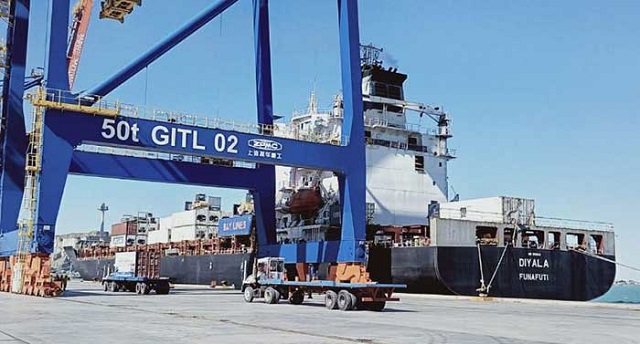June 2, 2020
A new era began on May 29, 2020, when Pakistan’s strategically located deep sea port of Gwadar was officially operationalized for Afghan transit trade, giving the war-torn and landlocked country a much shorter overland link, especially to its southern regions. Berthing at China-built Gwadar port, Afghanistan’s bulk cargo ship, SIBULK TRADITION, carried 16,000 tonnes of urea for transit to Afghanistan.
According to Advisor to Pakistan Prime Minister for Commerce and Investment, Abdul Razak Dawood, under the new development, Afghanistan was granted permission for transit trade of sugar and wheat from Gwadar where trucks carrying fully sealed consignments would now be allowed to go to the country. Dawood further stated that the bagging of the goods would now also be done locally to generate employment for the locals in Balochistan after which the goods would be transported on trucks. This is the first time this has happened as bagging was previously done at foreign ports.
Welcoming the development, Afghan Ambassador to Pakistan Atif Mashal stated that Pakistan’s decision to allow Afghan traders to import and export goods via the Gwadar port was set to greatly boost the bilateral trade and transit ties between the two neighbors. He further hoped that the boost in the trade ties between the two countries would also revive commerce and connectivity in Central and South Asia which would benefit the entire region.
Commenting on the new ease extended towards Afghan traders, Executive Director of Pakistan Afghanistan Joint Chamber of Commerce & Industry (PAJCCI), Naqibullah Safi, told the Center for Research and Security Studies (CRSS) that the timely operationalization of the Gwadar Port was extremely crucial for the Afghan traders who had been facing huge losses in their businesses due to the prolonged detention of consignments carrying bulks of cargo at Karachi Port since the COVID-19 linked lockdown was enforced in Pakistan in March 2020. Keeping in view the technical issues faced at Karachi Port and the amounting burden, Gwadar port could fairly divide the load for the shipment of goods.
Furthermore, not only is Gwadar closer to the southern provinces of Afghanistan, such as Kandahar, it also reduces the length of time spent for the consignment to reach the destination by road. Gwadar port had also promised Afghan traders that it would give more pre-demurrage and detention days for transport, once operationalized. While the Afghan traders had of late been contemplating the alternative routes of Chabahar and Bandar Abbas ports via Iran, the latest development had certainly brought the Afghan traders back to conducting transit trade through Pakistan, which is a win-win in terms of increased trade volume for both countries. Safi hoped that the new development would augur well for boosting Afghan imports and exports through the port and help flourish businesses in Afghanistan.
Afghanistan has relied on Pakistani overland routes via Karachi and Port Qasim ports for international trade since a bilateral deal was signed with Islamabad in 1965 – Afghanistan Transit Trade Agreement – which was revised in 2010 in the shape of Afghanistan-Pakistan Transit Trade Agreement (APTTA). The new agreement calls for better facilitation in the movement of goods between the two countries. Pakistan’s decision to open the Gwadar port for the Afghan transit trade was announced in October 2019 following which the first ship carrying containers for Afghan transit trade arrived at the Gwadar port on January 14, 2020.
The strategically located Gwadar port of Pakistan has been operated by China Overseas Port Holding Company and is being developed by China as part of the China-Pakistan Economic Corridor (CPEC) which is aimed to give access to China’s resource rich Xinjiang province to the rest of the world through the Indian Ocean. CPEC is a pivotal part of China’s flagship project – Belt and Road Initiative (BRI) – which is aimed at furthering Beijing’s influence and economic connectivity abroad with infrastructure projects funded by Chinese investments all over the world.
Iran’s Chabahar port, on the other hand, has been receiving much support from India for its development as India is barred from using the land route through Pakistan for its goods to be transported to Afghanistan and Central Asia. Chabahar, being India’s only next option, is being portrayed by some as a rival port of Gwadar though Iran has dismissed all such notions, stressing that Chabahar and Gwadar were sister ports which would complement each other in promoting future trade, transit and connectivity. Nevertheless, the Afghan trading community has enjoyed business partnerships with Pakistani businessmen since decades. Hence, now with the shorter link provided by Gwadar Port, trading through Pakistan would naturally become the convenient route for Afghan traders.
Sitwat Waqar Bokhari is a Research Fellow at the Center for Research and Security Studies (CRSS) and a Program Manager at Afghan Studies Center (ASC). She tweets at @SitwatWB.








